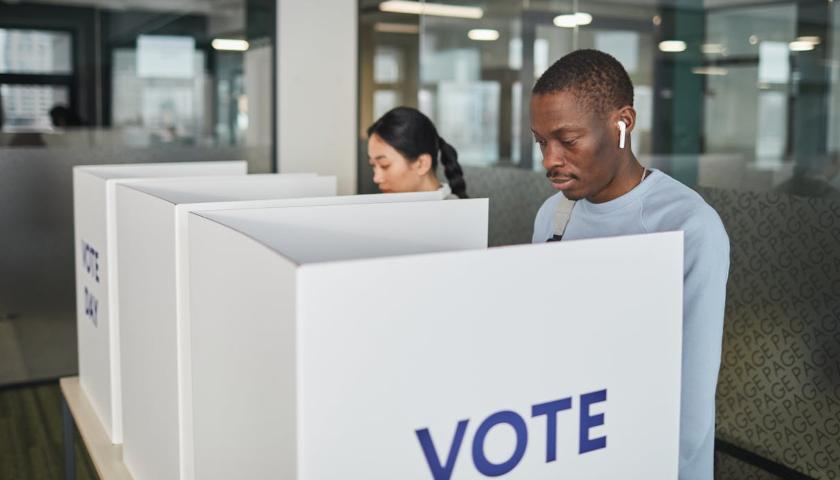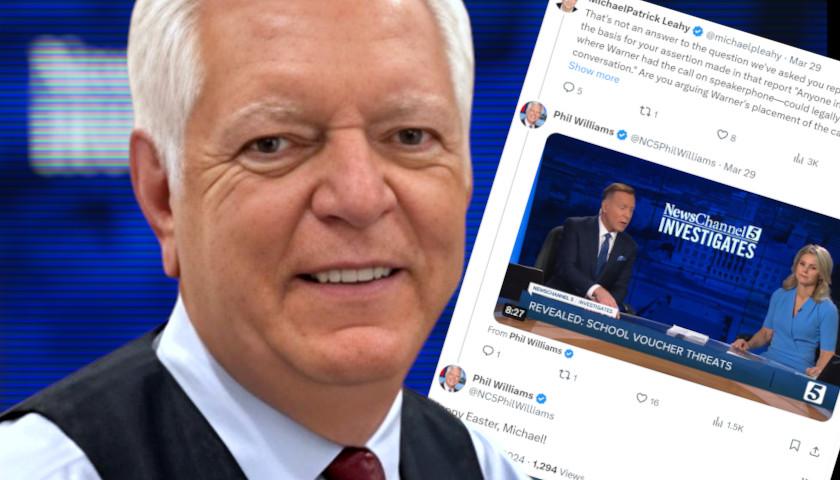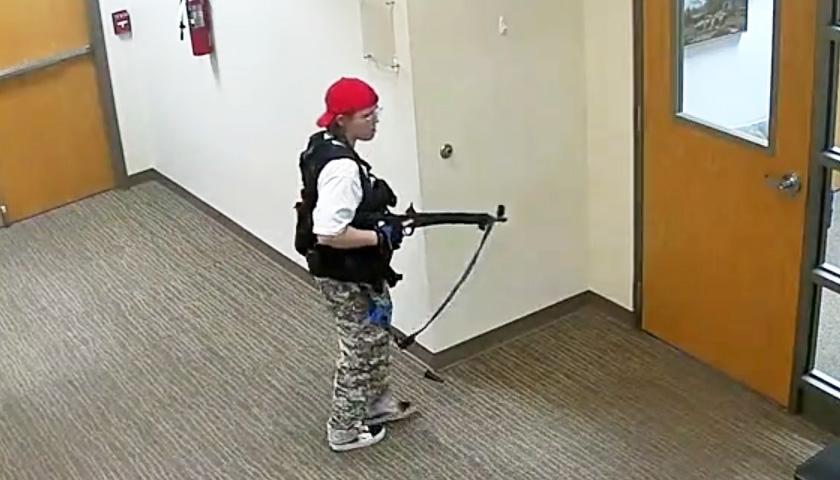In a special interview Wednesday on The Tennessee Star Report with Michael Patrick Leahy – broadcast on Nashville’s Talk Radio 98.3 and 1510 WLAC weekdays from 5:00 am to 8:00 am – Leahy welcomed Tiffany Jones Miller, Professor of Political Science at the University of Dallas to the show. Leahy and Miller continued their discussion from last week in which they discussed the historical progressive movement of the 20-30s and it’s effects on current K-12 public education.
During the second hour, Miller described her findings which rooted in the Institute of Frankfort (originally to be called the Marxist Institute). She explained how several of the institutes leading minds immigrated to Columbia University in the United States and therefore had a major impression on education methodology.
Miller expressed her concern for the future of America by way of the transformation of universities by stating, ‘It is ultimately a political movement. This is how they want to transform America. The first step is people need to become aware that we are living in a very unusual time. That we are living in a time in which so many of our basic institutions are genuinely up for grabs. What I mean by that, they are subject to being redefined in very radical ways.’
Leahy: And we are joined now by our new friend, Professor Tiffany Jones Miller. Professor of politics at the University of Dallas and an expert on the progressive movement in the early 20th century in America and its impact on our K-12 public education system. Good morning Professor Miller.
Miller: Good morning, how are you?
Leahy: Well, we’re great this morning. And we’re delighted that you have time to talk to us. And we got started on this because I was curious about the impact of John Dewey on K-12 education. And as you have told me, you said you thought you could understand what was happening in America in the early 20th century by just recovering who the earlier progressives were.
What they believed and what they accomplished. But you’ve learned something. There’s more to this story. (Miller laughs) Tell us the rest of the story as Paul Harvey used to say.
Miller: I turned to the earlier progressives thinking at the time because of the extent to which the people that called themselves liberals had recovered the term progressive. If I wanted to go back and understand progressivism, I would need to go back to the original progressives, right?
They were using the same name. And as I began to read their work more extensively what increasingly struck me was not the continuities but how different they were in certain ways. So just in some key ways, the earlier progressives were not atheists.
And in fact, some of the leading members, although you could argue about where some of them ultimately end up. But some of the leading members, including even John Dewey in the earliest phases of his career, were advocates of the social gospel movement.
Leahy: Exactly. Of course, Dewey in his early 30s became an atheist but started out in the social gospel. And I think Richard Rorty, his pragmatic philosophy descended from his grandfather who was part of the social gospel movement.
Miller: Yes, that’s right. Walter Rauschenbusch. That’s right. And so some of the leading progressive economists, the ones who’s work I’ve turned to, to kind of trace the broader policy impact. Just beyond education but kind of the broader public policy impact of the earlier progressive movement. Richard T. Ely. John R.Commons.
They were advocates. Ely was an advocate of a certain kind of Christian conception of socialism. You have to take the Christian part with a little bit, you have to use it with a little bit of care however because it’s a notion of Christianity that pretty much ends up in a secular idealism and gets shorn of an orthodox theological component.
In any case, the early progressives were advocates of the social gospel. So they are not expressed atheists. Like Marxists. Like the Bolsheviks. They were not sexual liberationists. Far from it. They were not seeking to dismantle the family.
They were seeking to shore up the family but from both the effect of market relations but also with a view to eugenics. They wanted the family to reproduce better and cultivate its children in a more ethical way than was occurring.
And so I was looking for sexual liberation and instead, I find growing government constraint over reproduction in an attempt to otherwise educate young Americans with a view to choosing who their spouse was with a view to the social welfare of the country.
Leahy: So the change that came from the early progressive ethical socialism, or Christian gospel. And now it’s evolved into a post-modern, atheistic, Marxism government state control. How did that happen?
Miller: So what I realized was obviously something that happened after the earlier progressives. In tracing that I think is somewhat complicated because there are a number of different sources. In effect, you can point to certain developments on the continent in terms of post-WWI Marxist thought…
Leahy: In Germany and that area.
(Commercial break)
Miller: One of the most important avenues by which transmogrified Marxism reemerges is with the founding of the Frankfort Institute in post-WWI Germany. So that’s in the early 20s. This is an institute of intellectuals who are Marxists. Some of whom are actually communist agents. And most of whom are kind of ethnically Jewish. But the original name for the institute that they had considered but then decided against was The Institute for Marxism.
Leahy: (Laughs) OK.
Miller: But when the Nazi’s took power and started moving aggressively towards the Jews. Even though some of these men were only ethnically Jewish, they had to flee. And so some of them ended up in the United States and were given a kind of safe haven at Columbia University where they were able to reestablish the Frankfort Institute in the United States.
And they produced some of the thinkers who most influential amongst the new left activists of the 1960s. Like Herbert Marcuse who was developing, he’s one among a number of figures who were kind of looking to explain why capitalism hadn’t collapsed yet.
And looking to kind of blend Marxism and Freudeinism in a way in which the explanation becomes the sexual morality of the bourgeois that is an important impediment to the collapse of capitalism. The kind of key to encouraging the revolution is to attack the morality that is sustaining it. And so the attack on the family becomes one of the defining features of the new left. Sexual liberation.
Leahy: So this Marxist institution transfers from Germany to Columbia University in the 1930s. So guess who was there? Well, you know this. (Miller chuckles) John Dewey had been at Columbia for some time. Was there some cross-fertilization between the Marxists coming from Germany and John Dewey at Columbia?
Miller: That’s a good question. I’m actually not sure about whether there was much of a connection there. I mean, Dewey was there and pretty influential. Other economists who were teachers at Columbia, Rexford Tugwell as you mentioned last time. Rexford Tugwell who was a member of FDR’s brain trust.
So the group of academics that FDR put together in 1932 in order to help him formulate his program of reform where he to be elected President as he was. And Tugwell is again kind of a descendant of the earlier progressives ethical socialism but he’s typically given very little attention. But as far as I can tell, he was actually a pretty influential advisor. And he certainly had very radical plans of his own for overhauling the United States.
Leahy: How did these Marxists ideas and sort of atheist ideas, anti-family ideas go from this Frankfort Institute of Marxist thought, neo-Marxist thought that was established at Columbia University by these German refugees in the 1930s? How did it then begin to penetrate the methodology of public education in the United States?
Miller: I think if you’re going to trace the influence of progressivism either in the later form or the earlier forms, the epicenter for the reforms is the university. It’s the academics who are re-thinking America. That the America that they’ve inherited both in terms of its ideas and existing social arrangements.
Academics have undue influence in this society. Where did the teachers come from? Where did the teachers on the primary and the secondary level come from? They come from universities. (Chuckles) Not only are they required to Bachelor’s degrees.
But they are required to get some sort of credential to maintain their livelihood. And so these reforms, this way of thinking gets passed along to the teachers when they’re students. And then who writes the textbooks?
Leahy: Oh yeah. You read the textbooks today and they are really pretty awful in terms of the ideology they support. Of course Howard Zinn, the famous anti-American is certainly one example of that. It seems to be ubiquitous of secondary school in terms of textbooks. When was it widespread, this sort of influence of the neo-Marxists? when did it become widespread in K-12 and is it getting better or worse?
Miller: I think it’s been a movement. So if you talk to academics my age and we were to reflect upon our earlier experience in the academy we can look back now and see signs of the emergence of the movement that is now kind of enveloping the nation.
That is increasingly dominating our culture and our social institutions. So is it getting better or worse? It’s growing in influence. And so what we’re seeing, the transformations that we’re seeing in the curriculum. The way in which America is essentially epitomized slavery and oppression. This is part of a larger kind of imperialistic exploitative…
Leahy: Which by the way, most secondary school students in America today believe that view of American history. Because they’ve been taught it.
Miller: Yes!. And look they’re young and they’re trusting. That was me when I was younger. You trust what you learn in your textbooks. You have a very naive view of these things and you don’t realize there are competing analyses. You just take what you’re given in the textbook and go with it. Unless you run into somebody who unsettles you in that regard, that’s what you’ll assume as true.
Leahy: As an academic, do you look at where do we go from here? How do we fix it? Is that one thing you look at or not?
Miller: Well, I am concerned about that because I’m not simply an academic, I’m a citizen. And the movement that is sweeping education, like I said, what I like to tell my students is, ‘If you want to see our political future go look at the academy.
Go look at the university and look at the way not only the way the curriculum been transformed but the arrangement of campus life has been transformed and there you will see the future. This is not just a movement that is designed to transform the university though it has profoundly transformed the university in the last several decades.
But it is ultimately a political movement. This is how they want to transform America. The first step is people need to become aware that we are living in a very unusual time. That we are living in a time in which so many of our basic institutions are genuinely up for grabs. What I mean by that, they are subject to being redefined in very radical ways.
Leahy: And very rapidly. That’s what I think we’re seeing.
Miller: The curriculum changes that you’re referencing in Tennessee, they’re popping up everywhere.
Tiffany Jones Miller is a Professor of Political Science at the University of Dallas. Her 2009 article, John Dewey and the Philosophical Refounding of America can be read here.
Listen to the second hour:
– – –
Tune in weekdays from 5:00 – 8:00 am to the Tennessee Star Report with Michael Patrick Leahy on Talk Radio 98.3 FM WLAC 1510. Listen online at iHeart Radio.








